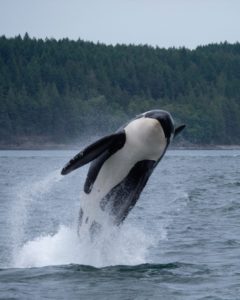CC0
TEKEVER Conducts First Drone-Based Marine Wildlife Detection
by DRONELIFE Staff Writer Ian M. Crosby
Advanced unmanned aerial systems leader TEKEVER has developed a new deep learning ability for its Unmanned Aerial Vehicles (UAVs) to autonomously gather marine wildlife data.
Continue reading below, or listen:
Presently used to facilitate marine conservation and research, the technology is also capable of supporting environmentally friendly business practices at sea through supplying intelligence on the presence of marine species at risk of being impacted by potentially disruptive activity.
Relying on its thorough research into the automatic detection of maritime vessels, TEKEVER was able to quickly alter its AI model and trained algorithms for the detection of various types of marine wildlife, such as whales and dolphins.
TEKEVER’s extensive investment into deep learning has brought about the ability to detect whales through their thermal signature, along with direct visual target detection utilizing statistical image analysis techniques. A combination of deep learning and classic computer vision techniques allows for the detection of pods of dolphins. TEKEVER continues to improve its models using data gathered during live operations to guarantee advanced detection performance.
TEKEVER has also partnered with CLS Group (Collective Localisation Satellites) to support the Italian Coast Guard through the deployment of its AR5 unmanned fixed wing aircraft to monitor whale migration and merchant vessels in the 84,000 square kilometer Pelagos Sanctuary, a protected marine area located between Italy, Monaco and France. This is the first instance of a drone being deployed to monitor and gather marine wildlife data, and has already allowed for the detection of a wounded whale. TEKEVER has carried out several drone operations under its contract with the European Maritime Safety Agency since 2018.
“Our new smart detection capability will prove instrumental in advancing our understanding of marine life and ensuring the continued protection of important species in their habitats,” said TEKEVER CEO Ricardo Mendes. “With the conservation of our environment rising to the top of the agenda for governments and organisations, our unique technology also enables sustainable business practices at sea that minimises disruption to marine wildlife.”
“TEKEVER has extensive experience operating unmanned aerial systems to detect activity on the water and provide real-time intelligence, surveillance and reconnaissance data,” added Principal Engineer Peter Saddington. “We are excited to now be applying this advanced technology to a new domain centred on marine life protection and conservation.”
Read more about TEKEVER and drones for marine conservation:
Ian attended Dominican University of California, where he received a BA in English in 2019. With a lifelong passion for writing and storytelling and a keen interest in technology, he is now contributing to DroneLife as a staff writer.
Miriam McNabb is the Editor-in-Chief of DRONELIFE and CEO of JobForDrones, a professional drone services marketplace, and a fascinated observer of the emerging drone industry and the regulatory environment for drones. Miriam has penned over 3,000 articles focused on the commercial drone space and is an international speaker and recognized figure in the industry. Miriam has a degree from the University of Chicago and over 20 years of experience in high tech sales and marketing for new technologies.
For drone industry consulting or writing, Email Miriam.
TWITTER:@spaldingbarker
Subscribe to DroneLife here.
https://dronelife.com/2022/10/21/drones-for-marine-wildlife-detection-tekever/
